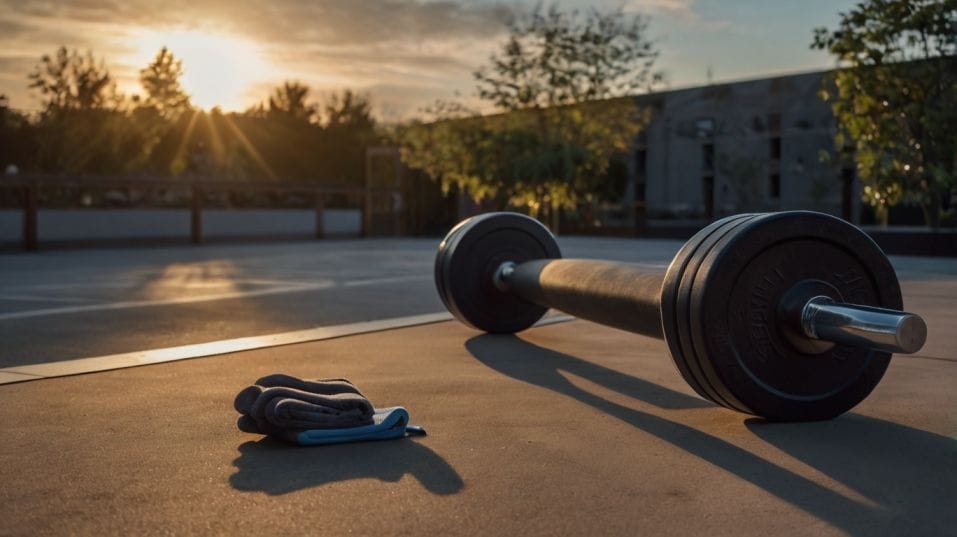Do Recovery Workouts Need Recovery Sleep?
Struggling to recover even with rest days? Discover why quality sleep—not just stretching—is the key to faster gains and real recovery.

Are you putting in the recovery work but still waking up sore, foggy, or run-down? Here's the truth: no amount of stretching or foam rolling can undo the damage of poor sleep.
If you're just getting serious about fitness or trying to build better health habits, this is your starting line. Real recovery doesn't happen on the mat—it happens in bed. Let’s make your rest day actually work for you.
Sleep: The Missing Link in Your Recovery Plan
Here’s what most people get wrong: they treat recovery like an optional side quest. Ice baths, mobility drills, a walk in the sun—that all has its place. But none of it sticks without sleep.
Every workout is a controlled breakdown. You challenge your muscles, deplete your energy stores, and create microtears in muscle tissue.
Recovery workouts help ease that tension and support circulation. But sleep is where the repair actually happens—cellular rebuilding, hormonal resets, glycogen replenishment, inflammation control. All while you’re horizontal.
During deep, slow-wave sleep (the kind you can’t fake), your body releases growth hormone in its highest concentrations. That hormone fuels muscle repair and helps rebuild tissue.
It’s also when your immune system kicks into gear, reducing systemic stress and inflammation. Miss out on that stage of sleep, and you’ll feel it—slower recovery, lower energy, more soreness.

You Can’t Out-Stretch a Sleep Deficit
You might be foam rolling daily, drinking electrolytes like it’s a religion, and doing 30-minute mobility flows. All good moves. But if you’re only sleeping five to six hours a night—fragmented, restless, inconsistent—you’re operating on a flat tire.
Sleep isn’t just another “nice to have” wellness metric. It’s the recovery driver. Your body is not designed to rebuild under sleep-deprived conditions.
You may feel like you're relaxing during a recovery workout, but without restorative sleep, you're just managing symptoms—never fixing the root issue.
This matters whether you’re a beginner easing into fitness or someone returning from injury. Recovery isn't about killing soreness. It’s about coming back better. And that doesn’t happen unless your sleep shows up.
Real-World Recovery: How to Build Sleep into Your Recovery Days
Good news: you don’t need to overhaul your entire life to sleep better. Most of this is about getting out of your own way. Your body already wants to recover.
You just need to stop disrupting its natural rhythm. Here’s how to start making sleep work with your recovery, not against it:
Treat Recovery Workouts Like Pre-Sleep Rituals
Recovery workouts—especially light cardio, mobility work, or stretching—lower cortisol and activate your parasympathetic nervous system. That’s your “rest and digest” mode.
Done in the late afternoon or evening, they can help prime you for better sleep. But you need to protect that state. Don’t blow it with a caffeine hit or screen time spike right after. Keep the energy low, the lights dim, and your mind quiet.
Eat to Recover and Sleep
What you eat post-recovery workout matters just as much as what you do. You want foods that replenish glycogen and support serotonin production (which converts into melatonin).
Think: oats, sweet potatoes, bananas, eggs, tart cherry juice. Skip the late protein shake laced with caffeine or stimulants. This is about recovery, not pre-workout vibes.
Cut the Sleep Saboteurs
You don’t need to live like a monk, but you do need to know what throws your recovery off. Blue light, late-night training, alcohol, doom-scrolling—all of it hits your nervous system and delays the quality sleep your body needs.
One bad night? You’ll feel it. String together four or five and you’ll wonder why your body’s still sore despite taking it “easy.” Swap mindless tech time for 10 minutes of slow breathing or light stretching before bed. Small shift, big payoff.
Sync Your Sleep With Your Training Rhythm
If you train early in the morning, aim to be in bed earlier—especially on recovery days. Your nervous system can’t recalibrate if you’re forcing it into inconsistent schedules.
If you’re a night owl, time your recovery sessions later in the day, so your sleep-wake rhythm stays aligned. Regularity matters more than perfection.
Stack Sleep Wins, Not Just Sleep Hours
It’s not about logging eight hours. It’s about getting enough deep sleep to rebuild tissue and reset your brain. You could be in bed for nine hours and still feel like trash if you’re tossing all night. Focus on quality over quantity.
Cool, dark rooms. Consistent sleep/wake times. No alcohol close to bedtime. These tweaks sound small—but they stack fast. Sleep debt doesn’t erase in a weekend nap; you need to build daily sleep credit.
The ROI of Better Sleep on Recovery Days
The best part? Once your sleep supports your recovery, everything else gets easier. You wake up with less stiffness. Your heart rate variability improves. Energy comes back. Focus sharpens. You don’t just feel more recovered—you are.
You’ll also notice that your next workout hits different. When your muscles get full sleep recovery, your performance gets a boost.
You lift heavier, move better, and fatigue slower. That’s the difference between just staying active and actually making progress.
And mentally? Better sleep improves emotional regulation and resilience. That means fewer excuses, more motivation, and less burnout. Your rest day becomes a launchpad, not just a pause button.
Final Thoughts
Recovery workouts are a smart move. But without real, consistent sleep, they’re like stretching a frayed wire—you’re not fixing anything.
Sleep is where the body actually recovers, rebuilds, and resets. When you make sleep a core part of your recovery process, every other habit works better.
Start tonight. Skip the screen. Dim the lights. Give your body the downtime it’s begging for. Let your recovery workout keep working—while you sleep. Stop treating sleep like a bonus. Start using it like the secret weapon it is.




